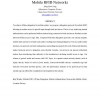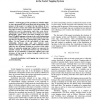111
click to vote
TWC
2010
14 years 8 months ago
2010
Abstract--As RFID tags become more widespread, new approaches for managing larger numbers of RFID tags will be needed. In this paper, we consider the problem of how to accurately a...
169
click to vote
TMM
2010
14 years 8 months ago
2010
With the exponential growth of Web 2.0 applications, tags have been used extensively to describe the image contents on the Web. Due to the noisy and sparse nature in the human gene...
155
click to vote
TCOM
2010
14 years 8 months ago
2010
Abstract--Arbitration and scheduling of multiple tags in stateof-the-art Radio Frequency Identification (RFID) systems is accomplished on the medium access control layer. Currently...
145
click to vote
INTERSPEECH
2010
14 years 9 months ago
2010
When no training or adaptation data is available, semisupervised training is a good alternative for processing new domains. We perform Bayesian training of a part-of-speech (POS) ...
120
click to vote
EJWCN
2010
14 years 9 months ago
2010
To achieve off-line delegation for mobile readers, we propose a delegation protocol for mobile RFID allowing its readers access to specific tags through back-end server. That is t...
131
click to vote
COMCOM
2010
14 years 11 months ago
2010
Embedding a Radio Frequency Identification (RFID) tag into individual items enables the unique identification of such items over the wireless medium, without the need for a line-o...
140
click to vote
IEEECGIV
2009
IEEE
14 years 11 months ago
2009
IEEE
Social tagging systems provide users with the ability to share information and extend their field of knowledge. The purpose of this paper is to explore the tag relations of user in...
142
click to vote
HCI
2009
14 years 12 months ago
2009
The popularity of social information systems has been driven by their ability to help users manage, organize and share online resources. Though the research exploring the use of ta...
127
click to vote
EMNLP
2009
14 years 12 months ago
2009
A significant portion of the world's text is tagged by readers on social bookmarking websites. Credit attribution is an inherent problem in these corpora because most pages h...
118
click to vote
EMNLP
2009
14 years 12 months ago
2009
We present a scalable joint language model designed to utilize fine-grain syntactic tags. We discuss challenges such a design faces and describe our solutions that scale well to l...


